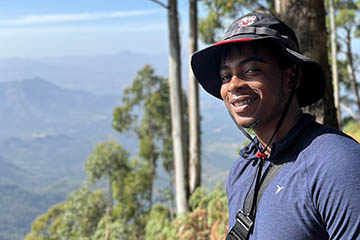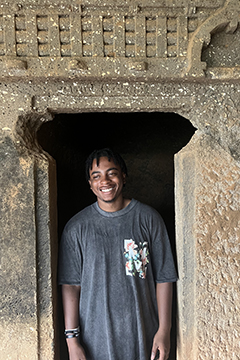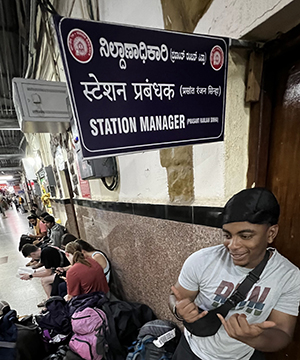
11/21/2023
While studying abroad in India this past summer, SUNY Cortland senior Frank Denteh experienced a land of frequent surprises.
Like when the biomedical sciences major and fellow students were heading out to explore some caves and monasteries when they were swept up by a crowd of joyous festival goers.
“We just happened to bump into people the same day heading to a festival on their way to their temple near our caves,” Denteh said. “We joined them. They encouraged us to dance with them and we did, and they encouraged us to take pictures. It was just an amazing experience.”
Denteh, who aspires to medical career and will graduate next spring, is a naturalized U.S. citizen who was born in Accra, Ghana, and grew up in Bronx, N.Y.
He was able to study health inequities in the world’s largest democracy with the support of a prestigious $5,000 Benjamin A. Gilman International Scholarship.

Frank Denteh visits an ancient temple in southern India.
"As with many countries, the stereotypical idea of an American in India is depicted as someone with a white skin tone, straight blond or brown hair and green or blue eyes," he wrote to the Gilman program when he applied for the scholarship. "That isn't the case at all, the United States is extremely diverse with Americans of all backgrounds. My attendance on this trip will bring an open eye to how diverse the United States is."
He is SUNY Cortland’s 15th Gilman Scholar, benefitting from a program managed by the U.S. Department of State. Its goal is to better prepare college students to thrive in the global economy and to expand the number of Americans studying and interning abroad.
In addition, the cost of Denteh’s trip was supported through several SUNY Cortland study abroad scholarships: the Charles A. Gibson scholarship, for study abroad; the Dr. Gilbert C. Brown ’51 and Shirley Haft Brown ’51 Scholarship, for students planning careers in medical fields; and the Barry L. Batzing Scholarship, for biological sciences and health majors.
From mid-July to mid-August, Denteh joined five other college students in the India: Health Equity Action Research project in Mumbai, Bangalore and Kodaikanal, in southern India led by SUNY Cortland Health Professor Jena Nicols Curtis.
His coursework aims to help prepare pre-med, health, human services and psychology students for future careers. Denteh hopes the experiences gained during his international foray will improve his chances at being accepted into a medical school right out of SUNY Cortland. Those experiences included working at India’s oldest anti-domestic violence organization and visiting the Dharavi Slum, considered one of the world’s most densely populated slum with about a million people living within one square mile of buildings and shacks.
During his trip, Denteh immersed himself in the daily activities of patients and providers, children and families, schools and teachers, investigating how race, ethnicity, religion, socioeconomic status, gender and gender expression, sexual orientation and geographic location shape health status and quality of life.
He focused his attention on how India’s caste system compared to forms of discrimination found elsewhere; but also took time to sample other cultural differences.

“The people in India are one of the nicest and most respectful people you will ever meet,” Denteh said. “India has a very large community aspect. The people are always looking out for one another and supporting each other despite their differences.”
“One thing that I personally enjoyed seeing in India, that no matter where you visit, you’ll see different religions practiced in the community,” Denteh said. “There might be separations: those who practice Hindu here, practice (Islam) here, practice Christianity here, but altogether they really try to make it work and help one another. They do not see themselves as separated by religion but as one community.”
Denteh has always lived with cultural diversity. He speaks three languages: English and two Ghanaian languages, Twi and Ga. And he’s visited the West African country of his family three times and relishes eating Ghanaian delicacies best served on a giant leaf.
Now, after his eye-opening summer in India, Denteh appreciates the support responsible for a transformational experience.
“I cherish this experience because a lot of students coming from minority groups are not always offered these opportunities,” Denteh said. “It was amazing knowing how much support students of minority backgrounds were getting.”